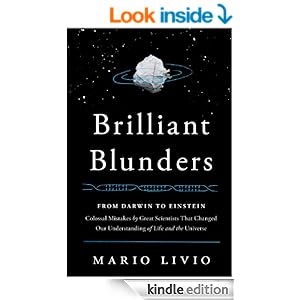… and Kas Thomas can’t. Can you imagine if Thomas were a high school teacher? What he said may be all be correct but where Darwin’s followers rule, it would make no difference. On display over at BigThink is their special way of interpreting evidence, in order to avoid concluding that Darwin was wrong.
(By the way, Thomas has no connection with us. We never heard of him until he blundered into what we thought was our turf, but the more the merrier).
 Meanwhile, in a review of a recent book, Brilliant Blunders by Mario Livio, Dyson (1923–) notes:
Meanwhile, in a review of a recent book, Brilliant Blunders by Mario Livio, Dyson (1923–) notes:
The five chief characters in Livio’s drama are Charles Darwin, William Thomson (Lord Kelvin), Linus Pauling, Fred Hoyle, and Albert Einstein. Each of them made major contributions to the understanding of nature, and each believed firmly in a theory that turned out to be wrong. Darwin explained the evolution of life with his theory of natural selection of inherited variations, but believed in a theory of blending inheritance that made the propagation of new variations impossible.
…
Darwin’s wrong idea was the blending theory of inheritance, which supposed the qualities inherited by offspring to be a blend of the qualities of the parents. This was the theory of inheritance generally accepted by plant breeders and animal breeders in Darwin’s time. Darwin accepted it as a working hypothesis, because it was the only theory available. He accepted it reluctantly because he knew that it was unsatisfactory in two ways. First, it failed to explain the frequent cases of hereditary throwback, when a striking hereditary feature such as red hair or musical talent skips a generation from grandparent to grandchild. Second, it failed to allow a rare advantageous variation to spread from a single individual to an entire population of animals, as required by his theory of the origin of species. With blending inheritance, any rare advantageous variation would be quickly diluted in later generations and would lose its selective advantage. For both these reasons, Darwin knew that the theory of blending inheritance was inadequate, but he did not have any acceptable alternative when he published The Origin of Species in 1859.
Nine years later, when Darwin published another book, The Variation of Animals and Plants under Domestication, he had abandoned the blending inheritance theory as inconsistent with the facts. He replaced it with another theory that he called pangenesis. Pangenesis said that the inheritance of qualities from parent to offspring was not carried in the seeds alone but in all the cells of the parent. Somehow the cells of the parent produced little granules that were collected by the seeds. The granules then instructed the seeds how to grow. For the rest of his life Darwin continued to believe in pangenesis, but it was another brilliant blunder, no better than blending inheritance and equally inconsistent with the facts. More.
What Darwin claimed natural selection could do is actually magic—but story for another day. For now, Freeman can say all this without risking a charge of the trite brigade, committed to enforcing Darwin’s diminishing truths, because he spent a lifetime establishing a habit of thinking for himself, allowing the facts to lead him.
The problem is that the trite brigade storms on, and it’s hard for anyone with evidence to be heard above the noise.
See also: Freeman Dyson: “… science is not a collection of truths. It is a continuing exploration of mysteries”
and
My opinion is that most people believe in intelligent design as a reasonable explanation of the universe, and this belief is entirely compatible with science. So it is unwise for scientists to make a big fight against the idea of intelligent design. The fight should be only for the freedom of teachers to teach science as they see fit, independent of political or religious control. It should be a fight for intellectual freedom, not a fight for science against religion.
Follow UD News at Twitter!